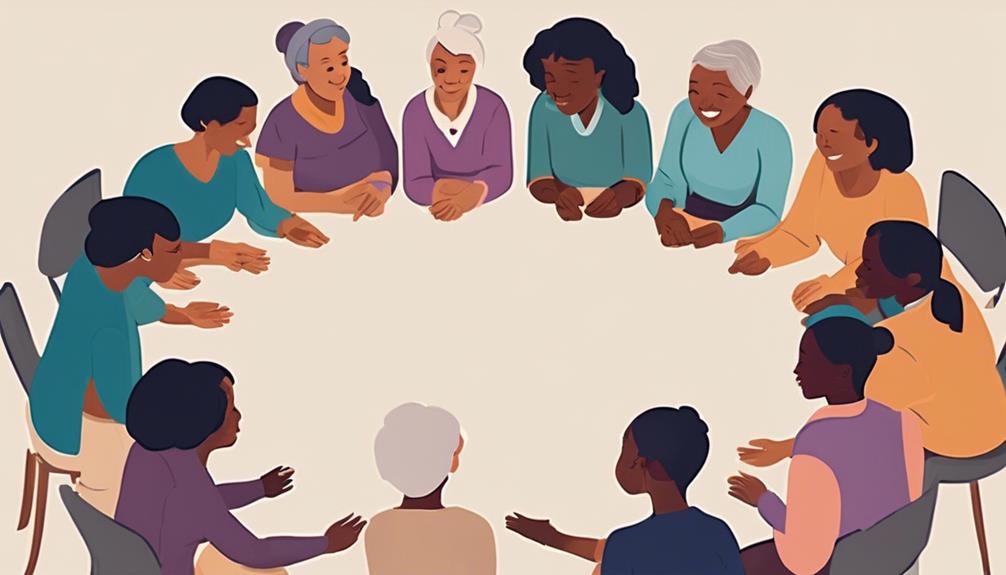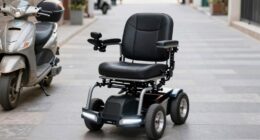At present, baby boomers who are taking on caregiving duties are like jugglers trying to juggle multiple tasks simultaneously. This caregiving responsibility not only affects the well-being of those they care for but also their own personal health and wellness.
But what strategies can they employ to ensure their own care while tending to others? Let's explore the unique challenges and support systems available for baby boomers in this vital caregiving role.
Key Takeaways
- Baby Boomers face financial strain due to caregiving expenses.
- Emotional toll on Baby Boomer caregivers increases risks of mental health issues.
- Balancing work with caregiving poses challenges for Baby Boomers.
- Tailored support services are crucial for Baby Boomer caregivers' well-being.
Demographic Trends in Baby Boomer Caregiving
In our exploration of the demographic trends in Baby Boomer caregiving, it becomes evident that one in four Baby Boomers currently serves as a caregiver in the United States. This statistic showcases the significant role that Baby Boomers play in providing care to their loved ones.
Among these caregivers, a substantial 61.7% are women, highlighting the essential caregiving contributions made by females within this demographic group. Additionally, the majority of Baby Boomer caregivers identify as White, with 74% aligning themselves with this racial category.
It is noteworthy that more than half of Baby Boomer caregivers have been undertaking their caregiving responsibilities for a minimum of two years, demonstrating a profound long-term commitment to supporting their care recipients. Moreover, over a quarter of these caregivers dedicate more than 20 hours per week to caregiving duties, emphasizing the substantial time investment required in fulfilling their caregiving roles.
These demographic trends underscore the vital role that Baby Boomers play in the caregiving landscape of the United States.
Challenges Faced by Baby Boomer Caregivers

Navigating the complex landscape of caregiving, Baby Boomer caregivers encounter a myriad of challenges that impact various aspects of their lives.
- Financial Strain: Many Baby Boomer caregivers face financial difficulties due to the expenses associated with caregiving. The costs of medications, medical appointments, and specialized care can quickly add up, creating a significant burden on their finances.
- Emotional Toll: The emotional toll of caregiving can be overwhelming for Baby Boomers, leading to increased risks of depression and anxiety. Witnessing the decline in their loved one's health, managing challenging behaviors, and coping with the uncertainty of the future can take a heavy emotional toll on caregivers.
- Lack of Support: Baby Boomer caregivers often experience isolation and a lack of support, further exacerbating their challenges. Feeling alone in their caregiving journey can impact their overall well-being and make it harder to cope with the demands of caregiving while maintaining a healthy work-life balance.
Impact on Baby Boomers' Health and Well-Being
Facing the demands of caregiving while managing our own health and well-being, Baby Boomer caregivers navigate a delicate balance that often takes a toll on our physical and emotional resilience. With a higher prevalence of chronic health conditions such as arthritis, asthma, and COPD, 63% of us have one or more chronic illnesses, leading to lower self-rated health and increased disability.
Balancing caregiving responsibilities with work can result in significant physical and emotional health challenges, as 15% of us report frequent mental distress, highlighting the impact on our overall well-being. Consistent breaks from caregiving and effective self-care practices are crucial for maintaining our health and emotional stability.
Striving for a better work-life balance is essential to ensure that we can continue to provide care while also taking care of ourselves. Prioritizing our well-being through self-care practices and seeking support when needed are vital steps in managing the challenges of being both a caregiver and a person with our health needs.
Support Resources for Baby Boomer Caregivers

Support resources for Baby Boomer caregivers encompass a range of services provided by local Area Agencies on Aging, offering essential assistance and connections to help navigate the challenges of caregiving. These agencies play a crucial role in supporting caregivers through various means:
- Caregiver Support Services: Local agencies provide a wide array of caregiver support services, including counseling, educational resources, and access to support groups, tailored to meet the unique needs of baby boomer caregivers.
- Respite Care: Offering much-needed breaks for caregivers, respite care services provided by these agencies allow caregivers to take time for themselves, recharge, and prevent burnout.
- Caregiver celebration days: Organizing special events to honor and recognize the dedication of baby boomer caregivers, these celebration days provide a sense of appreciation and support for their selfless efforts.
Future Outlook for Baby Boomer Caregivers
As the demand for caregiving services escalates with the growing population of older adults, the future outlook for baby boomer caregivers necessitates proactive strategies and robust support systems to navigate the impending challenges ahead.
The number of older adults in need of care is projected to increase significantly, potentially overwhelming the existing caregiver workforce. To support the aging baby boomer caregiver cohort, public health initiatives are crucial in strengthening and bolstering the caregiver workforce.
Plans must be put in place to address the specific needs of aging baby boomers and their caregivers effectively. Tailored support initiatives are essential to cater to state-level variations in caregiver services and outcomes.
Looking ahead, it's imperative to consider the future outlook of the caregiver workforce, the evolving needs of older adults, and the importance of implementing proactive measures and tailored support systems to ensure the well-being of both caregivers and care recipients in the face of these impending challenges.
Frequently Asked Questions
How Do the Baby Boomers Affect Us Today?
Baby boomers affect us today in profound ways through their diverse experiences, valuable insights, and lasting contributions. Their influence spans various aspects of society, from culture and economics to healthcare and technology.
As a generation, we appreciate the wisdom and perspective they bring, enriching our communities and shaping our collective future. Their impact resonates across generations, fostering connections and understanding that shape our world for the better.
How Are Baby Boomers Affecting Healthcare?
We see baby boomers shaping healthcare in various ways. Their growing needs and expectations are driving innovations in services and technologies. They're advocating for more personalized care and better access to resources.
As a result, healthcare providers are adapting to meet their demands and preferences. Baby boomers are influencing the industry to prioritize patient-centered approaches and improve overall quality of care. Their impact on healthcare continues to evolve, driving positive changes for all.
When Should You Stop Being a Caregiver?
When caregiving starts to significantly impact our own well-being and health, it's crucial to recognize the signs and consider seeking support.
Setting boundaries and prioritizing self-care is essential to prevent caregiver strain. Knowing when to step back from caregiving is a personal decision that should prioritize our quality of life.
It's important to listen to our bodies and emotions, and seek help when needed to ensure we can continue to care for others effectively.
What Did Baby Boomers Contribute to Society?
Baby Boomers contributed to society in profound ways. Their impact spans cultural, social, and political realms, driving change in civil rights, women's rights, and various movements.
They were pioneers in technology, business, and the arts, shaping modern industries. Their advocacy for social justice and equality left a lasting legacy on healthcare, education, and the economy.
Baby Boomers have truly made a mark on society through their activism and innovation.
Conclusion
In conclusion, as baby boomer caregivers, we must prioritize our own well-being while caring for our loved ones. It's crucial to seek support, take breaks, and practice self-care to maintain our health and happiness.
Remember, Rome wasn't built in a day, and neither is the journey of caregiving. Let's embrace the challenges, seek out resources, and continue to support each other as we navigate this fulfilling yet demanding role.
Together, we can thrive and find balance in our caregiving journey.









